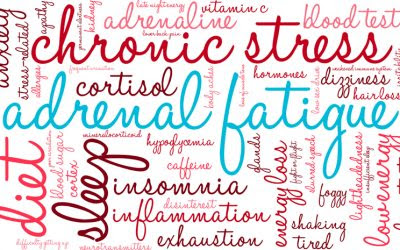You cannot swim for years in a sea of stress without drowning. The only difference is that drowning in stress is a very slow and debilitating process resulting in progressively worsening biopsychosocial symptoms (body, mind, relationships).
I met with an individual recently who was prescribed, by his PCP, an antidepressant and a minor tranquilizer (i.e., Xanax, Ativan, Klonopin) for his anxiety. Unfortunately, in the 15 minutes his doctor spent with him a full biopsychosocial evaluation was not performed, but at least the doc referred him to a therapist (which rarely happens) after diagnosing him through a brief interview.
The outcome of my evaluation was nothing short of outrageous. He hated his job of 15 yrs and his marriage was on the edge of complete dissolution. Clearly a good 90% of his life (work and marriage) was dissatisfactory and stressful on a daily basis.
This individual engaged in NO exercise and so we looked at food and chemical consumption patterns. Fortunately, he only drank alcohol on weekends (often to excess), however, he poured a pot of coffee down his gullet every morning, stopping at Star Bucks for a large latte on the way to work, and drank a 2 liter bottle of coke throughout the work day (often with a shot of Red Bull!), not to mention a pack of cigarettes. His diet was no better, consisting of fast food (stop calling it "food"!) with daily consumption of refined white carbs (turns to sugar in your gut my friends!) luncheon meats, sugary snacks, etc, etc. (DEPRESSION: The Brain-Gut Connection)
No pill, in fact, no AMOUNT of pills, is going to help this individual and eventually he will experience a reverse effect of the medications and they may become an additional toxin in the process of drowning in a Sea of Stress or he will become victim to the pharmaceutical treadmill of more meds and higher doses.
The brain is a powerful organ that will completely overwhelm and annihilate the effects of medications, due to tolerance and continuing a dysfunctional, toxic lifestyle. Individual's grind through the pharmaceutical mill on a prescribed cocktail of drugs, but still racked with depression and anxiety symptoms, because the depression and anxiety based symptoms have become signs of a physiological disorder as opposed to just a "mental" disorder.
ADRENAL FATIGUE: Signs and symptoms of Adrenal Fatigue include tendency to gain weight and inability to lose it, especially around the waist, high frequency of getting the flu and other respiratory diseases with symptoms that tend to last longer than usual, tendency to tremble when under pressure, reduced sex drive, lightheadedness when rising from a prone position, brain fog, lack of energy in the afternoon, reliance on coffee to get the day started, fibromyalgia, chronic fatigue, craving for salty and fatty foods, hypoglycemia, chronic pain of unknown origin and feeling better during a vacation. None of these signs or symptoms by themselves can definitively point to Adrenal Fatigue. However, as a group of symptoms, in the context of an otherwise healthy person, they do form a specific Adrenal Fatigue Syndrome or picture, that is, of a person under stress and the body’s failing physiological response to deal with such a burden. Adrenal Fatigue, as a debilitating condition, is not recognized by conventional medicine and is thus missed by most conventionally trained physicians. LINK
Many researchers estimate that approximately 80% of the U.S. population is experiencing symptoms of adrenal fatigue (Confronting the Demon of Doom). If you are in recovery from chemical or behavioral addictions, most likely you're dealing with symptoms of adrenal fatigue. If you have an autoimmune disorder (Lyme, Lupus, fibromyalgia, chronic fatigue, etc) adrenal exhaustion may aggravate your symptoms. Those diagnosed with depression, anxiety, bipolar, panic disorder depending on the duration of these conditions may result in adrenal fatigue symptoms or be caused by hormonal imbalances of the adrenal glands. PTSD, and especially complex PTSD and trauma sufferers are also prone to this physiological condition. In addition, those suffering from chronic pain over many years may aggravate the hormonal functioning of the adrenal glands.
ADRENAL FATIGUE: Causes and Effects on the Body
Recovering from adrenal fatigue, depending of the amount of stress and length of time the stress has been experienced, can be a long slog lasting over a year or more and requires a full evaluation of life stressors and identifying ways to reduce that stress and adjusting food and chemical consumption is crucial.
How to Overcome Adrenal Fatigue



No comments:
Post a Comment